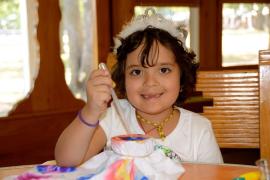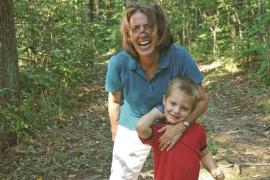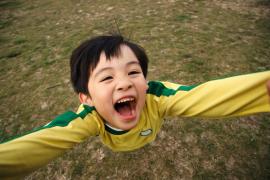Worrying when our kids are away from us is normal for parents. Every time I’ve ever dropped my kids off for a new adventure without me, I’m excited for them. But I’m also concerned about their safety, secretly wishing they would just stay home, then counting the days until they return. I know it’s not rational (few things about parenting are), but I believe my kids are always safest when they’re home with me.
If you are new to sending your kids to summer camp, let me reassure you that while they are away, you can relax your worrying muscles. I’ve spent the past three decades working at a summer camp, sending my kids to other camps, and participating in the networking and training of summer camp professionals. I know A LOT of camp directors, have visited many camps through the American Camp Association accreditation process, and am a faithful reader of Camping Magazine. I definitely know about camp.
Before I share why you should not worry while your kids are at camp, let me qualify that the reasons below pertain to accredited camp programs. The accreditation process is cumbersome, because the camp needs to meet over 250 standards. That’s what I like about it. By choosing an accredited program, you can be assured that the camp meets industry standards. If the summer camp you choose for your child is not accredited, then I recommend that you verify for yourself what their standards are in these areas. Then you can decide if you need to worry.
Here are five reasons not to worry while your kids are at (an ACA-accredited) camp this summer:
1. They’ll have more supervision than almost anywhere else
When your kids are at camp, they will have more adults caring for them than in almost any other setting. To see the required supervision ratios at accredited camp programs (based on the children’s age), visit this American Camp Association page, which refers to staff screening, supervision, and training. Ratios generally range from 1:5 to 1:10, depending on the age of the campers and the activity.
From my own observation, there are far fewer adults supervising kids at school during recess, and I found data to back up this impression: “As instruction, most courts agree that, in typical school age (ages 6-12) playground environments, an appropriate student to supervisor ratio ranges between 40:1 and 90:1.2."
Obviously, then, those 1:5 to 1:10 ratios at accredited camps make for a much more supervised environment for kids to play and interact with each other.
2. They’ll be safer than they are on a sports field or in your backyard.
Many parents look at the types of activities kids do at camp and their safety alarm goes off. Swimming? Archery? Campfires? It all sounds so dangerous!
And yet, these and other high adventure activities are supervised by trained staff using safety equipment such as helmets and harnesses and following procedures that ensure a reduced risk of injury. Camp staff who teach an activity like rock climbing are given extensive training before they put a camper “on belay” (the harness system).
Did you know that camp insurance companies don’t allow camps to have trampolines due to how high the risk is for injury? Camps have insurance, health, and other inspections to ensure that they are using best practices to operate their activities. This is a higher standard than most people’s backyards.
In the Healthy Camp Study, which analyzed data from several camps over a five-year period, the injury rates for both day and residential camps were much lower than the rates for many popular sports.
3. Camp counselors receive more training than most parents.
Most camps provide at least a week of training before the summer begins. Many counselors are also required to complete online trainings and certifications before arriving at camp. Camp counselors learn about age group characteristics and how to use positive behavior management techniques. They also have a network of co-counselors and experienced supervisors to guide and support them throughout the summer. I’ve often lamented that a prerequisite for parenthood should be camp counselor training!
4. They’ll benefit from being unplugged.
Do you worry about your kids having too much screen time? I know I do. It’s impossible to miss how today’s teens and young adults—these so-called “screenagers”—are scrolling their way through life and navigating relationships with quick-moving thumbs. We should be worried about our kids’ screen usage and how it’s impacting their social skills development, especially when we read that the average teen spends 6.5 hours a day looking at a screen! One thing I most look forward to about camp is my kids having an extended period of unplugged time, without me nagging them at all.
5. They are feeling happier than they do almost anywhere else.
Many kids say that camp is their “happy place,” and my own research on how camp experiences impact kids’ overall happiness backs this claim. In my 2015 study on the impact of camp on social well-being (i.e., happiness), 3 out of every 4 children surveyed reported being “a little happier” or “a lot happier” after their summer camp experience. So, since as parents one of our top priorities is that our kids flourish and not feel depressed or anxious, being at camp is a great reason NOT to worry about how your kid is feeling.
If you tend to worry about your children, why not take a break and send them to camp this summer?
It could do all of you some good!
Resources/Related:
5 Essential Summer Camp Packing Tips Every Parent Should Know
5 Fun Ideas for Letters to Campers
Ep. 32: Benefits of Summer Camp for Teens
10 Messages for a Homesick Camper
10 Reasons GREAT Parents Choose Summer Camp for Their Kids
Photo courtesy of Gold Arrow Camp in Lakeshore, California.
Audrey “Sunshine” Monke, MA, with her husband Steve, has owned and directed Gold Arrow Camp (Lakeshore, California) for the past 30 years. She has been a member of ACA since 1989 and was president of the Western Association of Independent Camps (WAIC) from 2007–2010. Audrey researches, writes, and speaks about camp, parenting, friendship skills, and positive psychology. Her upcoming parenting book (Center Street, 2019) offers ideas for bringing the magic of summer camp home. Sign up for Audrey’s book updates at sunshine-parenting.com or contact her directly at [email protected].
Originally published at sunshine-parenting.com
The views and opinions expressed by contributors are their own and do not necessarily reflect the views of the American Camp Association or ACA employees.



